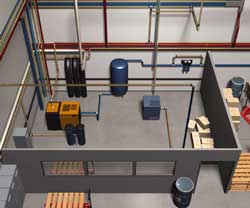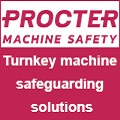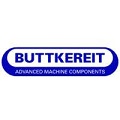
Posted to News on 22nd Jan 2009, 11:26
Is your compressed air system wasting energy and money?
Atlas Copco Compressors explains the process by which the health of a compressed air installation can be checked in order that cost- and energy-savings can be made.

Although industry at large is highly dependent upon the reliable supply of compressed air as a vital element within most manufacturing processes, it is surprising just how often the condition and efficiency of this essential utility is taken for granted. With the bare minimum of regular maintenance or a fit-and-forget approach, such a straightforward element as compressed air could actually be responsible for generating substantial energy losses and have a marked effect on a company's bottom line. So, while it is obvious that a compressed air system operating at peak efficiency will save money, it is a fact that not every operator is aware of just how fit their installation potentially could be - and with today's spiralling energy costs there has never been a better time to find out just how healthy it is.
How healthy is your compressed air system?
A programme to check the fitness level of your compressed air system should include monitoring and inspecting the running of the compressors as well as the capacity and fitness of the dryers and all the ancillary equipment such as receivers, filters, drains and oil/water separators. The programme should also examine the state of the control and monitoring system, together with that of the pipework and general system.
To begin with you should conduct a detailed examination that starts with an assessment of the size and capacity of the compressor installation and its running profile relative to the compressed air application. That means noting the hours it is loaded/unloaded or the operating hours that are actually timed during the examination. Running pressure should also be checked to ensure that it is at a level appropriate to the demands of downstream processes, as excessive downturn of the delivered air pressure can waste energy. Any other relevant observations on standards of performance can also be made at this stage.
Equally vital to the efficient running of a compressor system is the accuracy and efficiency of the control and monitoring systems that are in place, so they also merit significant attention.
The next subjects on the inspection programme are the dryers, whether they are integral to the compressors or downstream standalone units sited before the point of use. The inspection programme should note the size and type dryer, the accuracy of the dewpoint indicator and the functionality of the waste water drain. Then, starting with air receivers, the inventory of ancillary equipment should then be scrutinised. That means determining the operating pressures of filters and the condition of filter elements, as well as that of condensate drains and oil/water separators.
Pressure drops
But, without doubt, one of the largest energy-loss culprits that you should focus upon has to be the condition and configuration of the airnet pipework, where even the smallest leaks can create significant pressure drops. For instance, a 3mm diameter hole anywhere within a distribution network, perhaps caused by corrosion, can mean a compressor using an additional 4kW of power to maintain system pressure.
The effect of pressure drops can represent more than 75 per cent of the running costs during the working life of a compressed air installation. So, apart from detecting corrosion-generated leaks and loose pipework joints and fittings, it is equally important to ensure that pipework runs are installed at the minimum distance between compressed air source and the point of use if optimum system air pressure is to be maintained.
Reporting
After the examination process is completed, you should ensure that you document everything you have found as, (adhering to the old truism that 'if you don't begin to measure it, you won't begin to manage it') once analysed, this information will show exactly where fitness levels can be improved and savings made.
Free Health Check
As part of its continuing commitment to keeping energy and production costs down to a minimum, Atlas Copco Compressors is offering UK-based compressed air plant operators a free compressed air system Health Check carried out by an expert. It is a non-intrusive procedure that will not interfere with production processes and is designed to examine the entire air supply system − compressors, filters, dryers, pipework, ancillaries, controls and monitoring − and highlight every energy-consuming feature.
Experience shows that the highest levels of compressed air system efficiency are invariably obtained through a combination of factors, so, once a Health Check has been carried out on a system, the plant operator will be in a position to make an immediate assessment of the remedial priorities required to meet desirable levels of energy- and cost-efficiency
Once the engineer's report has been submitted there is no obligation for the compressor operator to adopt any of the report's recommendations, but Atlas Copco specialists will be on call if required to assist with the implementation of any necessary improvements highlighted by the examination and deemed to be of benefit to economic plant operation.
With this free Health Check offer, compressed air plant operators have nothing to lose but a little of their time. In today's financial climate, it may prove to be a very worthwhile investment.
A free compressed air system Health Check can be booked by calling Atlas Copco Compressors in the UK on 0800 181 085 or by emailing [email protected].






























